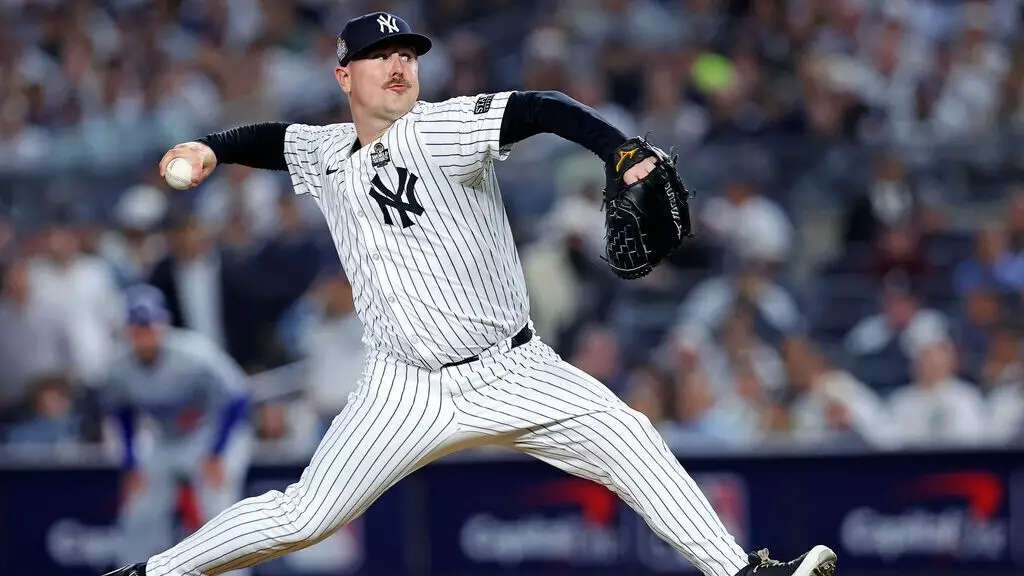The Major League Baseball (MLB) offseason often brings with it a flurry of activity surrounding player contracts and salary negotiations. This year has been no different, as evidenced by the recent arbitration decisions involving pitchers Mark Leiter Jr. of the New York Yankees and Dennis Santana of the Pittsburgh Pirates. Both players faced setbacks in their financial requests, highlighting the competitive nature of MLB salary negotiations and the evolving landscape of player contracts.
Mark Leiter Jr., a right-handed pitcher nearing his 34th birthday, experienced a tough break at the arbitration hearing. He sought $2.5 million but was awarded $2.05 million instead, a decision made by an arbitration panel comprising Allen Ponak, Robert Herzog, and Scott Buchheit. Leiter’s recent performance, marked by a 4.50 ERA over 60 relief appearances with the Chicago Cubs and Yankees, likely influenced the panel’s decision. His mixed results with both teams (4-5 overall) also provided statistical backing for the Yankees‘ stance, emphasizing how performance can significantly impact salary negotiations.
During the 2022 season, Leiter illustrated both promise and vulnerability. His contributions included a noteworthy presence in postseason play, where he managed to secure a win against the Cleveland Guardians in Game 4 of the American League Championship Series, despite giving up a tying run later in the game. This blend of highs and lows illustrates the complex nature of evaluating player worth in MLB, particularly for relievers, whose performance can vary drastically from game to game.
Similarly, Dennis Santana, a 28-year-old right-hander, faced disappointment in his arbitration hearing. He requested a salary of $2.1 million but received a lesser amount of $1.4 million. The arbitration panel, which included Brian Keller, Richard Bloch, and Margaret Brogan, weighed Santana’s overall numbers—3-1 with a 3.89 ERA in 62 appearances—against his career statistics of 11-15 with a 4.76 ERA across seven seasons. These figures emphasize the balancing act players must navigate; while Santana’s demand reflects his desire to be evaluated positively, the realities of his overall career performance may have weighed heavily on the final decision.
Their experiences in arbitration serve as a reminder that players‘ earnings aren’t solely tied to individual aspirations; they are significantly influenced by prior performances and the collective economic climate of MLB.
In contrast to the disappointments faced by Leiter and Santana, Alex Vesia of the Los Angeles Dodgers managed to circumvent the arbitration process entirely. He agreed to a one-year deal that guarantees him a salary of $2.3 million, adding an interesting twist to the narrative surrounding pitchers this offseason. Vesia’s remarkable performance in 2022, including a 1.76 ERA over 67 appearances and a flawless postseason record, underscored his value and supported a successful negotiation with the Dodgers.
The varying outcomes for players like Leiter, Santana, and Vesia illustrate a broader truth about MLB: contracts can be a reflection not just of individual talent but also of the strategic foresight a player and their representatives bring to the table. Successful negotiations often require an interplay of performance metrics, projected market trends, and the prevailing health of the franchise’s finances.
As the arbitration hearings continue for several players, including those from the St. Louis Cardinals and Washington Nationals, the overall impact on MLB operations becomes clearer. Player requests reflect not only personal aspirations but also the broader economic climate of the league. With teams often prevailing in arbitration cases—three out of four this year—the system may inadvertently discourage players from seeking fair evaluations of their worth.
Future negotiations will likely be characterized by the trends set in these early cases. Teams may feel emboldened by recent successes, while players might need to recalibrate their expectations and strategies when entering arbitration discussions. The delicate balance of power continues to evolve within MLB, and the experiences of players like Leiter, Santana, and Vesia provide a window into that transformation.
The arbitration process remains a vital aspect of MLB’s economic landscape, influencing not just player salaries but also team dynamics and future negotiations. The outcomes serve as a reminder of the intricacies involved in valuing talent in professional sports. As the league navigates these tumultuous waters, the experiences of individual players will continue to shape the broader narrative of player contracts and negotiations in Major League Baseball.


Napsat komentář